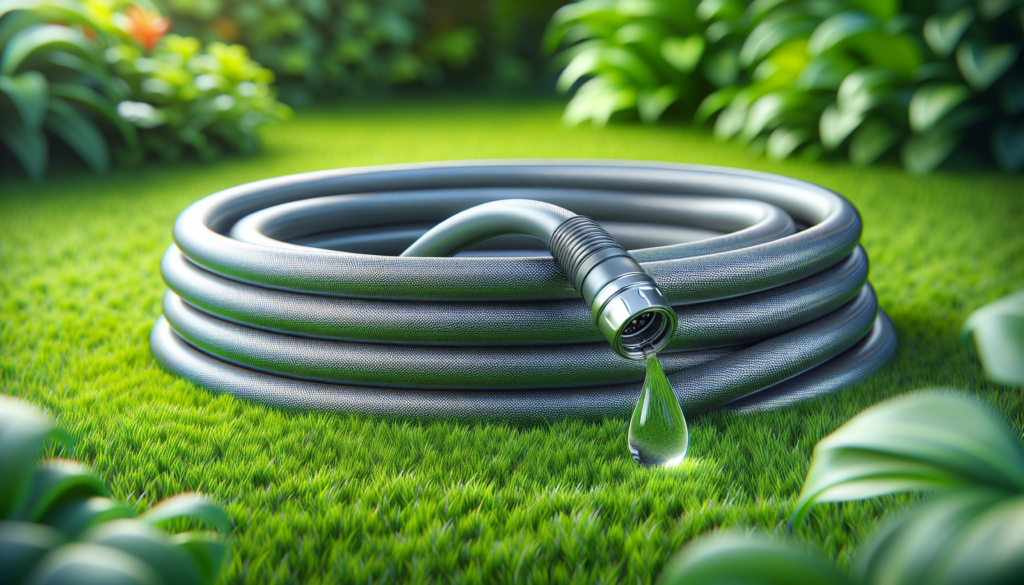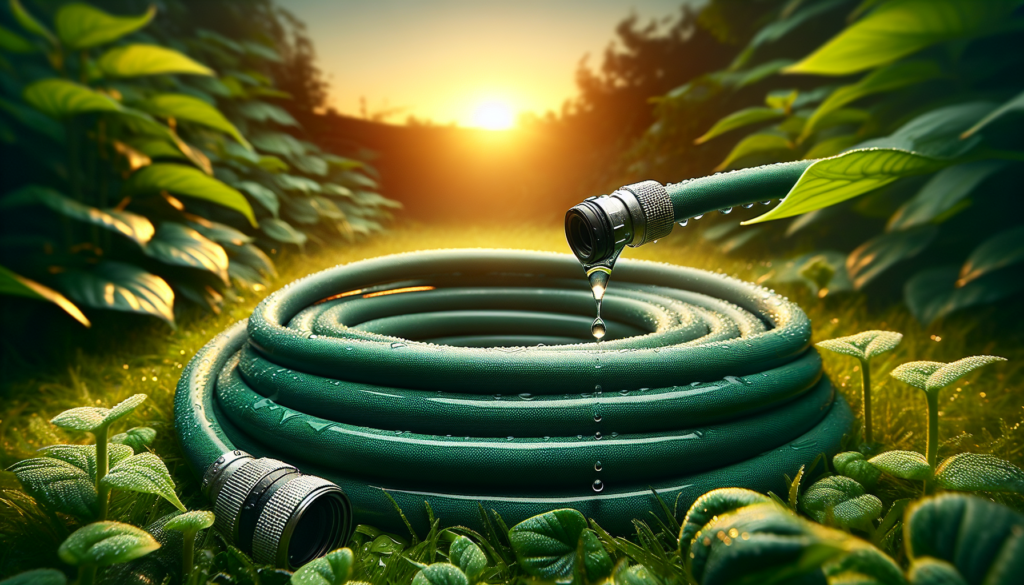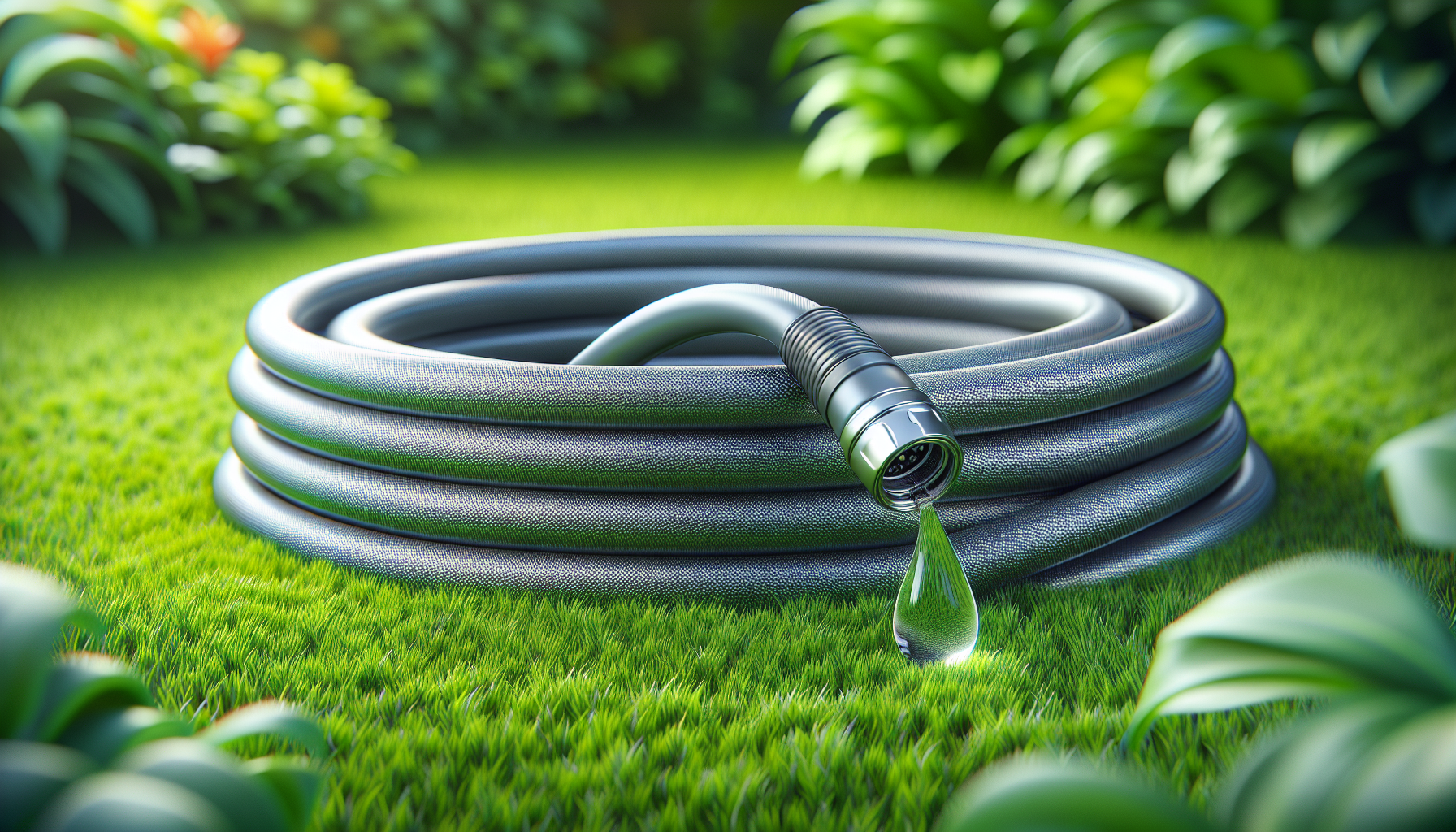Are you tired of wrestling with your garden hose, only to find it frustratingly tangled and kinked? Look no further, because in this ultimate guide, we will reveal the secrets to finding a kink-free hose that will make watering your plants a breeze. Say goodbye to those frustrating tangles and hello to effortless gardening. Let’s dive in and explore the different types of hoses that are designed to stay kink-free, so you can spend less time fighting with your hose and more time enjoying your garden.

Materials
When it comes to choosing a hose that is resistant to kinking, it is important to consider the material it is made of. Here are three popular options to explore:
Rubber hoses
Rubber hoses are known for their flexibility and durability. They are often reinforced with layers of fabric or mesh to provide added strength, making them less prone to kinking. Rubber hoses are also resistant to abrasion, making them a great option for heavy-duty use. However, they may be heavier than other types of hoses, so keep that in mind if you are looking for something lightweight.
Vinyl hoses
Vinyl hoses are a popular choice for many homeowners due to their affordability and ease of use. They are generally lightweight and flexible, making them easy to maneuver around the garden. While they may not be as durable as rubber hoses, high-quality vinyl hoses can still provide resistance to kinking with proper care and maintenance.
Polyurethane hoses
Polyurethane hoses are becoming increasingly popular due to their excellent kink resistance. They offer a good balance between flexibility and durability, making them a great choice for various outdoor applications. These hoses are often reinforced with a mesh or braid, giving them added strength and preventing kinks from occurring. However, they may come at a higher price point compared to other materials.
Construction
The construction of a hose plays a crucial role in its ability to resist kinking. Here are a couple of key factors to consider:
Reinforcement
The reinforcement of a hose refers to the additional layers of material, such as fabric or mesh, added to enhance its strength. Hoses with multiple layers of reinforcement are less likely to kink, as they can handle higher pressure and maintain their shape better. Look for hoses with reinforced layers for optimal kink resistance.
Thickness
The thickness of a hose’s walls also contributes to its ability to resist kinking. Thicker walls provide more stability and prevent flexing, reducing the chances of kinks forming. However, keep in mind that thicker walls may also result in a heavier and less flexible hose, so finding the right balance is important.
Bend radius
The bend radius refers to the minimum radius at which a hose can be bent without causing damage or compromising its performance. Hoses with a smaller bend radius are more flexible and less likely to kink when navigating tight corners or obstacles. Consider the specific environment in which you will be using the hose and choose one with a suitable bend radius.
Length
Determining the right length for your hose is crucial to prevent unnecessary kinking and ensure optimal functionality. Here are a couple of things to consider:
Determining your needs
Start by assessing your specific needs and the intended use of the hose. Measure the distance from your water source to the farthest point you’ll need to reach. Keep in mind that having extra length can be beneficial for versatility, but avoid getting a hose excessively longer than you require to minimize the risk of kinking.
Avoiding unnecessary length
Remember that longer hoses can be more prone to kinking, especially if they are not properly supported or stored. If your measurements indicate that you need a shorter hose, opt for one that offers the right length without unnecessary excess. This will help to reduce the chances of kinks developing and make it easier to manage and store your hose.
Diameter
Choosing the right diameter for your hose is essential to balance flow rate and pressure while minimizing the risk of kinking. Consider the following factors:
Choosing the right size
Hose diameter is typically measured in inches, with common sizes ranging from ½ inch to ¾ inch. The size you choose depends on your specific needs and the flow rate you require. Smaller diameter hoses are generally sufficient for average watering tasks, while larger diameter hoses are better suited for heavy-duty applications requiring a higher flow rate.
Balancing flow rate and pressure
It’s important to strike a balance between flow rate and pressure when choosing the diameter of your hose. A smaller diameter hose will provide higher pressure but may result in a reduced flow rate. On the other hand, a larger diameter hose will offer increased flow rate but at the expense of lower pressure. Consider your watering needs and find the diameter that best suits your requirements without compromising on kink resistance.

Fittings
The fittings of a hose play a crucial role in preventing kinks by providing secure connections and allowing for smooth water flow. Consider the following aspects when evaluating hose fittings:
Quality materials
Investing in high-quality fittings is essential to ensure a secure connection between the hose and various attachments. Look for fittings made of corrosion-resistant materials such as brass or stainless steel, as they provide durability and longevity. These materials are less likely to deform or loosen over time, reducing the risk of kinking at the connection points.
Secure connections
Properly installed fittings can help prevent leaks and kinks. Ensure that the fittings are securely attached to the hose by following the manufacturer’s instructions. Hand-tighten the fittings snugly, but avoid overtightening, as this can potentially cause damage to the hose or fittings.
Anti-Kink Technology
To further enhance kink resistance, hoses often incorporate various anti-kink technologies. Here are a few common types:
Coiled hoses
Coiled hoses are designed to automatically recoil into a compact shape after use, minimizing the chances of kinks forming. These hoses are typically made from materials with good retractability, such as polyurethane or certain types of vinyl. They are ideal for small gardens or applications that require frequent movement.
Fabric hoses
Fabric hoses are constructed with a woven or knitted fabric outer layer, providing enhanced flexibility and durability. These hoses are designed to prevent kinks and twists while allowing for easy maneuverability. The fabric outer layer also offers some protection against abrasion and UV damage, increasing the overall lifespan of the hose.
Spiral-reinforced hoses
Spiral-reinforced hoses feature a helical wire or coil embedded within the hose structure. This reinforcement provides excellent kink resistance while maintaining flexibility. Spiral-reinforced hoses are often used in heavy-duty applications where extra strength is essential, such as industrial or commercial settings.
Weather Resistance
To ensure a kink-free hose that remains in good condition over time, it is important to consider its resistance to various weather conditions. Some aspects to examine are:
UV protection
Exposure to sunlight can cause hoses to degrade and lose their flexibility over time. Look for hoses with UV protection that shield against harmful ultraviolet rays. UV-resistant hoses are typically constructed with materials that can withstand prolonged sun exposure without deteriorating, minimizing the chances of kinking and prolonging the lifespan of the hose.
Freeze resistance
If you live in an area with cold winters, it is crucial to choose a hose that is resistant to freezing. Freeze-resistant hoses are designed to withstand low temperatures without cracking or becoming brittle. These hoses are often reinforced with materials that allow for expansion and contraction, ensuring flexibility even in freezing conditions.
High-temperature tolerance
In contrast to freeze resistance, hoses that are exposed to high temperatures, such as those used in hot water applications or near heat sources, should have the ability to withstand elevated temperatures. Look for hoses specifically labeled as heat-resistant to prevent kinks and maintain optimal performance in high-temperature environments.
Durability
A durable hose is less likely to develop kinks and will provide you with long-lasting performance. Here are some factors to consider in terms of durability:
Abrasion resistance
Hoses that are resistant to abrasion can withstand rubbing against rough surfaces without developing weak points or kinks. Look for hoses with a sturdy outer layer made of materials that offer abrasion resistance, such as rubber or certain types of vinyl. This will help ensure the hose maintains its integrity and kink-free performance even in challenging environments.
Tension strength
The tension strength of a hose refers to its ability to withstand pulling or stretching without breaking or deforming. Opt for hoses made from materials known for their tensile strength, ensuring they are less susceptible to damage and kinking during regular use. Reinforced hoses often offer superior tension strength, making them a reliable choice for heavy-duty applications.
Crush resistance
Hoses can often be subjected to being stepped on, run over, or crushed by heavy objects. A hose with good crush resistance will bounce back to its original shape and remain functionally intact. Consider hoses that are designed to withstand crushing forces without kinking or deforming to ensure durability in high-traffic or demanding environments.
Flexibility
The flexibility of a hose is crucial for ease of use and maneuverability, as well as its resistance to kinking. Here are a couple of aspects to look for in terms of flexibility:
Ease of maneuverability
A flexible hose allows for easy maneuverability around obstacles or tight spaces, reducing the risk of kinks. Consider hoses with good flexibility that can be easily bent or coiled to navigate your garden or outdoor space without any restrictions. Flexible hoses are also easier to handle and store, enhancing overall convenience.
Resistance to twisting
Twisting can lead to kinking and reduced water flow, so it is important to choose a hose that is resistant to twisting. Look for hoses specifically designed with anti-twist technology, such as textured exteriors or inner liners, to prevent tangling and twisting during use. This will help maintain a smooth water flow and prevent unnecessary kinks in the hose.
User Reviews
When searching for a kink-free hose, it is always helpful to research and consider user reviews. Hearing from other customers who have already used the product can provide valuable insights. Take the time to read reviews and consider specific needs and requirements. Pay attention to feedback on kink resistance, durability, flexibility, and any other factors that are important to you.
Researching customer feedback
Take advantage of online platforms, forums, or review websites to gather customer feedback on different hose brands and models. Look for reviews specifically mentioning kink resistance and assess the overall satisfaction of users who have purchased these hoses. This will help you make a more informed decision and narrow down your options.
Considering specific needs
Everyone’s needs and preferences may vary, so it is important to consider your specific requirements when reading user reviews. Keep in mind the intended use of the hose, the size of your outdoor space, and any other factors unique to your situation. By considering specific needs, you can better evaluate which hoses are most likely to provide the kink-free experience you are looking for.
In conclusion, finding a kink-free hose involves considering various factors such as the materials used, construction, length, diameter, fittings, anti-kink technology, weather resistance, durability, flexibility, and user reviews. By taking into account these factors, you can select a hose that is highly resistant to kinking, ensuring a hassle-free watering experience for years to come. Remember to evaluate your specific needs and priorities to find the perfect hose that meets your requirements. Happy gardening!
